|
|
|
Sort Order |
|
|
|
Items / Page
|
|
|
|
|
|
|
| Srl | Item |
| 1 |
ID:
118920
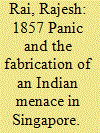

|
|
|
|
|
| Publication |
2013.
|
| Summary/Abstract |
This paper examines how local and transnational developments converged in 1857 to transform European attitudes towards Indian inhabitants in Singapore. Recognized in preceding years as useful to the security and the development of the colony, by late 1857, Indians in Singapore had come to be viewed by Europeans as a 'menace'. That change in disposition was largely the product of factors extraneous to the actions of the local Indian inhabitants themselves. Besieged by news of multiple challenges to the British Empire, European nerves were rattled by perceived threats emanating from sections of the Asian populace in Singapore. In early 1857, a dispute between Tamil-Muslims and Europeans brought to the fore the latter's anxieties and prejudices. That episode was followed, in May, by news of the massive rebellion of native troops in India. The emerging distrust for Indians was exacerbated by public rumours and fanned by editorials and reports published in the local press. Perceptions of immediate danger from the colony of transported convicts, and the fear of an Indian conspiracy during Muharram, sparked a panic that would have ramifications on the position of Indians in Singapore and leave an imprint on the long term political development of the Straits Settlements
|
|
|
|
|
|
|
|
|
|
|
|
|
|
|
|
| 2 |
ID:
030273
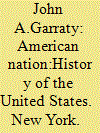

|
|
|
|
|
| Publication |
New York, Harper and Row, publishers, incorporated, 1966.
|
| Description |
920p.hbk
|
|
|
|
|
|
|
|
|
|
|
|
Copies: C:1/I:0,R:0,Q:0
Circulation
| Accession# | Call# | Current Location | Status | Policy | Location |
| 002140 | 973/GAR 002140 | Main | On Shelf | General | |
|
|
|
|
| 3 |
ID:
173868
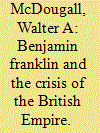

|
|
|
| 4 |
ID:
032469


|
|
|
|
|
| Publication |
Cambridge, Cambridge University Press, 1963.
|
| Description |
vii, 363p.Hbk
|
|
|
|
|
|
|
|
|
|
|
|
Copies: C:1/I:0,R:0,Q:0
Circulation
| Accession# | Call# | Current Location | Status | Policy | Location |
| 007937 | 942.05/HUS 007937 | Main | On Shelf | General | |
|
|
|
|
| 5 |
ID:
095095
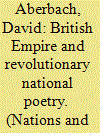

|
|
|
|
|
| Publication |
2010.
|
| Summary/Abstract |
The British empire set off an explosion of poetry, in English and native languages, particularly in India, Africa and the Middle East. This poetry - largely neglected in the scholarship on nationalism - was often revolutionary both aesthetically and politically, expressing a spirit of cultural independence. Attacks on England and the empire are common not just in native colonial poetry but also in poetry of the British isles. This article discusses some of the most influential poets, including: Shawqi of Egypt, Tagore of India, Rusafi of Iraq, Yeats of Ireland, Iqbal of Pakistan, Greenberg of pre-State Israel, and Kipling, the 'poet of empire'. In contrast with other empires, many poets were inspired by British culture to create revolutionary art and seek political independence. Most strikingly, British rule was instrumental in the revival of vernacular Hebrew poetry after 1917 as the centre of Hebrew literature shifted from Odessa to Tel Aviv.
|
|
|
|
|
|
|
|
|
|
|
|
|
|
|
|
| 6 |
ID:
025387
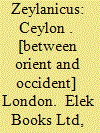

|
|
|
|
|
| Publication |
London, Elek books Ltd, 1970.
|
| Description |
288p.hbk
|
| Standard Number |
236176579
|
|
|
|
|
|
|
|
|
|
|
|
Copies: C:1/I:0,R:0,Q:0
Circulation
| Accession# | Call# | Current Location | Status | Policy | Location |
| 005762 | 954.93/ZEY 005762 | Main | On Shelf | General | |
|
|
|
|
| 7 |
ID:
173966


|
|
|
|
|
| Summary/Abstract |
‘We cannot allow [Nasser], who has neither the authority of a throne nor of a parliament to destroy our base and threaten our rear’ Harold Macmillan, diary entry for 23 September 1955
|
|
|
|
|
|
|
|
|
|
|
|
|
|
|
|
| 8 |
ID:
145456
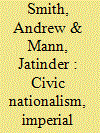

|
|
|
|
|
| Summary/Abstract |
This article explores the three themes of civic nationalism, imperial identities and Punjabi migration by focusing on the life of Sundar Singh, a migrant to Canada who came to prominence in the early 1900s, through his speeches. Sundar Singh employed the idea of equal status of all British subjects in the British Empire to argue for the migration of Sikhs to Canada and other British settler societies and their being treated with respect and fairness on their arrival in their new homes. Although Singh's claim to Britishness was rejected in many sections of Canadian society, it was supported by some white Canadians. The article suggests that British identity of the Empire's Dominions could, in some circumstances, be a force for the inclusion of South Asians. The article also illustrates the way in which developments in India impacted upon those of the diaspora across the British Empire. This idea is developed by demonstrating the importance of the triangular relationship between India, the United Kingdom and Canada as highlighted by the issue of Punjabi migration within the British Empire.
|
|
|
|
|
|
|
|
|
|
|
|
|
|
|
|
| 9 |
ID:
161190
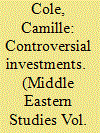

|
|
|
|
|
| Summary/Abstract |
This article examines two sites of British investment in nineteenth-century Iraq, exploring the different interests and ideologies – both British and Ottoman – underlying each one, and using the funding controversies which plagued both projects as windows on the political and economic relationships which crystallized through these ventures and informed post-war governance. Ottoman Iraq provides an important perspective on global British economic interests: although it encompassed zones of Britain's informal empire, the Ottoman state intensified its own imperial ambitions towards the end of the nineteenth century. This created tensions within Ottoman policies towards the British, which were complicated by the friction between British state and commercial interests. By 1914, the controversies which plagued both projects seemed close to a breaking point. The outbreak of the First World War, however, entrenched existing patterns of financial and infrastructural involvement as part of the occupation, and encouraged the creation of a development paradigm in the Mandate.
|
|
|
|
|
|
|
|
|
|
|
|
|
|
|
|
| 10 |
ID:
092677
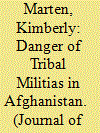

|
|
|
| 11 |
ID:
053186
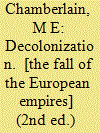

|
|
|
|
|
| Edition |
2nd ed.
|
| Publication |
Oxrford, Blackwell Publishers, 1999.
|
| Description |
xvi, 140p.Hbk
|
| Series |
Historical Association Studies
|
| Standard Number |
0631218041
|
|
|
|
|
|
|
|
|
|
|
|
Copies: C:1/I:0,R:0,Q:0
Circulation
| Accession# | Call# | Current Location | Status | Policy | Location |
| 042557 | 940/CHA 042557 | Main | On Shelf | General | |
|
|
|
|
| 12 |
ID:
107444
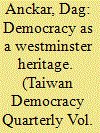

|
|
|
|
|
| Publication |
2011.
|
| Summary/Abstract |
Conventional wisdom from colonial history research has it that the states which
the British left behind them were better equipped for democratic government
than the states that had belonged to other colonial powers. Investigating the
democracy fortunes of all fifty-four territories that were freed following World
War II from British control, and applying Freedom House ratings to determine
democracy status, this study examines the belief that democratic government
has become a characteristic feature of former British possessions. Findings are
that the former colonies may be ordered roughly into three groups. Whereas
seventeen countries since 1972 have always, or almost always, been classified as
democracies, a larger portion, consisting of twenty-three countries, has always,
or almost always, been ranked as non-democracies. The remaining fourteen
countries represent an in-between category. On the whole, therefore, the idea
that democracy is a central part of the Westminster heritage overall cannot
be supported. Explanations for the division of the former colonies into three
groups have been researched in different directions, and the efforts substantiate
earlier observations in the literature on the relevance to democratization of
factors that relate to state size, modernization, and geography. Concerning the
impact of the length of colonial rule, the findings confirm an earlier suggestion
by Samuel Huntington that colonies which had a long British presence have
been particularly well equipped to develop into stable democracies.
|
|
|
|
|
|
|
|
|
|
|
|
|
|
|
|
| 13 |
ID:
118709


|
|
|
| 14 |
ID:
091435
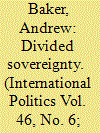

|
|
|
|
|
| Publication |
2009.
|
| Summary/Abstract |
Great Britain is regarded as a classic example of the Weberian state, and thus as a model of a developed state that might be contrasted with developing states. However, this view conceals the formative role of empire in the evolution of the British state. Rather than take the distinction between a 'metropolis' and a 'periphery' as given, this article explores the mutual constitution of state and empire. What it finds is that the political identity of the British state changed dramatically during the first half of the twentieth century as British intellectuals and policy-makers attempted to develop a new political community, primarily through the vehicle of the Commonwealth. The British state of the interwar years decentralised its decision making and embedded itself firmly in new multilateral networks. A rationalised, centralised British state emerged after the Second World War and only then within a context of multiple (principally Atlantic and European) political identities. The modern British state is as much a post-colonial invention as are states of the 'developing' world.
|
|
|
|
|
|
|
|
|
|
|
|
|
|
|
|
| 15 |
ID:
098144
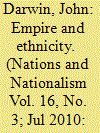

|
|
|
|
|
| Publication |
2010.
|
| Summary/Abstract |
Historians and social scientists have typically assumed a conflictual or exploitative relationship between empire and ethnicity. On the one hand, empire might be seen (as perhaps Ernest Gellner saw it in Nations and Nationalism) as a superstructure of coercion to which a group of ethnic units were subject. On the other (according to an influential view), empire fabricated ethnicities (tribes or castes) to divide and rule. This article suggests that both of these views are too crude. In the British case at least (and in the modern history of empire, no generalisation that excludes the British case has much value), 'imperial ethnicity' was a much more subtle phenomenon. It existed 'at home' as one element in a more complex identity. It was a powerful force in British settler societies, where an indigenous identity could not be imagined. And, perhaps surprisingly, it was deeply attractive to some colonial elites in Asia and Africa - at least for a time.
|
|
|
|
|
|
|
|
|
|
|
|
|
|
|
|
| 16 |
ID:
126174
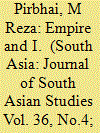

|
|
|
|
|
| Publication |
2013.
|
| Summary/Abstract |
Framed in a discussion of post-colonial approaches to the British Empire's influence on culture, a close reading of Captain Donald Campbell's late eighteenth-century travelogue contextualises the personal particularities in his assessments of Habsburg Europe, Ottoman West Asia and Mysorean/British South Asia. His is an imagination in which the bonds of 'religion' ameliorate the 'otherness' of continental Europeans, while his concept of 'enlightenment' learning is deployed to understand the Ottomans. Only in the case of South Asia is the very humanity of the 'other' denied. I argue that this landscape of otherness reflects the coincidence of the interests of his 'self' and the 'Empire', which overlap most thoroughly in South Asia. Campbell's travelogue is of value to post-colonial approaches, as it is a particularly poignant example of the manner in which the particularities of the 'self' contribute to the construction of broader cultural discourses permeated by 'Empire'.
|
|
|
|
|
|
|
|
|
|
|
|
|
|
|
|
| 17 |
ID:
102747
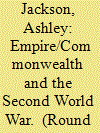

|
|
|
|
|
| Publication |
2011.
|
| Summary/Abstract |
The whole British Empire was involved in the Second World War from its outset. This article challenges the myth of Britain 'alone' against Hitler; one-fifth of the world's population was at war because Britain was. Britain called on vast colonial resources to defend a global empire and global trade. The importance of the African continent has been overlooked, but Africa experienced a large range of military activities by land, sea and air and personnel from all over the Empire served there.
|
|
|
|
|
|
|
|
|
|
|
|
|
|
|
|
| 18 |
ID:
114384
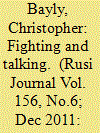

|
|
|
| 19 |
ID:
163846
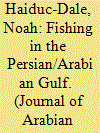

|
|
|
|
|
| Summary/Abstract |
The last two centuries have brought dramatic changes to the Persian/Arabian Gulf. Yet while imperial politics and newfound wealth altered much about coastal Gulf societies, fishing remained a remarkably steady enterprise. Rather than immediately changing alongside regionally altering events, fishing provided a stable livelihood for many Gulf coast residents throughout the eighteenth and nineteenth centuries, and even beyond the first half of the twentieth century. The main contention of this paper is that due to environmental limitations, the Gulf provided enough resources for local consumption, but not enough to justify large investment by foreign powers, such as the British Empire. This fact left local fishermen and political leaders in control of fishing. It also enabled fishermen to adapt to new technologies and markets at their own pace, rather than being compelled to do so by imperial powers. Even the twentieth century oil economy initially provided new markets for traditional fisheries rather than replacing them with industrial fishing fleets.
|
|
|
|
|
|
|
|
|
|
|
|
|
|
|
|
| 20 |
ID:
062899
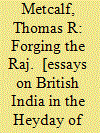

|
|
|
|
|
| Publication |
New Delhi, Oxford University Press, 2005.
|
| Description |
317p.hbk
|
| Standard Number |
0195667093
|
|
|
|
|
|
|
|
|
|
|
|
Copies: C:1/I:0,R:0,Q:0
Circulation
| Accession# | Call# | Current Location | Status | Policy | Location |
| 049749 | 954.031/MET 049749 | Main | On Shelf | General | |
|
|
|
|
|
|
|
|
|